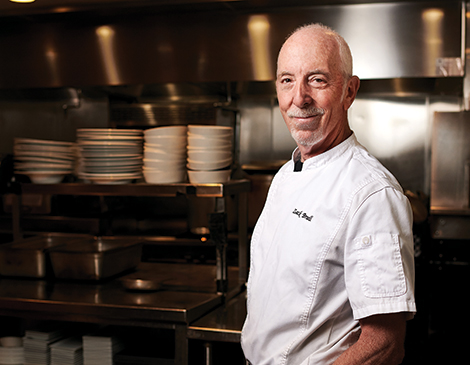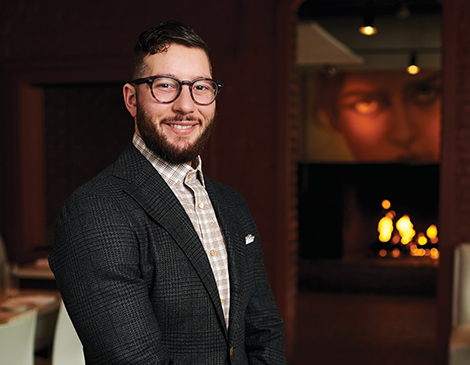How Cleveland Chef Zack Bruell Found the Ideal Partner in His Son Julian
by Lisa Sands | Jun. 7, 2022 | 12:00 PM

Jeani Brechbill Photography
Almost 20 years in, Parallax Restaurant & Lounge, Zack Bruell’s Asian-fusion restaurant in Tremont, is still the place to be on a Saturday night. Stylishly dressed patrons stand elbow to elbow waiting to be seated, overrunning the small vestibule and spilling into the jam-packed bar. Bartenders shake and pour cocktails while waitstaff, trays in hand, deliver drinks. At the far end, two chefs frantically churn out sushi rolls to keep up with demand.
The best seats in the house are in view of the open kitchen where Zack himself, in chef whites, stands at his command station, inspecting every dish and giving it a finishing touch. Sometimes he spins the plate, looking at the dish from all angles, before placing a spoon, a set of chopsticks, a few lemon slices or a drizzle of sauce. Within seconds, the plate is dispatched to its eager recipient.
Few restaurants in the city have been around as long as Parallax, which Wine Spectator declared the "big hit of the year" after it opened in 2004. It has survived a recession, a pandemic and now an unprecedented workforce shortage.
Zack’s other restaurant, L’Albatros Brasserie & Bar, is aging just as well. Since opening in University Circle in 2008, the cozy carriage house restaurant has cultivated a fervent following. In 2009, The New York Times called it “Paris on Lake Erie,” and it regularly appears on "best of" lists for its French cuisine, cocktails, patio and nighttime vibe.
Every so often, Zack takes a sip of the sauvignon blanc he keeps nearby before turning around to survey the dining room behind him. Tonight, he appears pleased. Relaxed, even.
Maybe it’s because — after decades of making it on his own — he has a new partner and a plan.
Zack’s journey began when he opened his first restaurant in 1985. By 2016, his portfolio had ballooned to 10 restaurants with more than 500 employees, and he found himself spending more time in the restaurants than he had planned — and less time pursuing his other passion, golf.
So, last year, Zack split from his longtime partners and gave up ownership in Alley Cat Oyster Bar, Collision Bend Brewing Co. and the now-closed Cowell & Hubbard. The move allowed him to spend more than six months almost exclusively at L’Albatros, hyper-focused on every meal and experience. A close study of Parallax is now underway.
At nearly 70 years old, Zack is as fit and tenacious as a prizefighter with one last championship in him. But he wants his restaurants to live on — and thrive — even beyond that. And that’s where his son and partner, Julian, enters the story.
This is no ordinary passing of the baton from father to son. Julian was not expected, nor pressured, to join the family business. Far from being a cushy landing spot of an only son, the road ahead will be grueling — and both Julian and Zack know it.
“I can’t remember the last time he wasn’t ‘work dad,’” Julian says.
“I’m not easy to work with,” Zack concedes. “But he isn’t either, too, because he’s so driven. We work a lot. We don’t compromise.”

Julian Bruell knows who you are, who you’re with and what you like.
In 2016, Julian joined his father as director of service, an all-encompassing role leading the front-of-house operation. But titles don’t matter when the dining room is at peak capacity. In the heat of the dinner rush, Julian acts as a utility player, supporting the waitstaff, running food, picking up discarded chopstick wrappers, checking on each table and offering wine recommendations with aplomb.
“Our level of service is like an orchestra. It’s amazing. Beautiful. People think service is easy, but it’s a dying art,” Julian says.
Zack had a sixth sense about Julian’s potential at an early age. Julian had the right temperament and personality for the restaurant business, though his talents were not in the kitchen. At 14, Julian polished glasses at Parallax and did anything else his father asked of him. Zack would send Julian into the dining room to meet guests and noticed how comfortable he was.
After all the work was done, the two would have dinner together. Sometimes they would eat at other restaurants and Zack would point out all of the things he would not tolerate in his own place — like mediocre food or an apathetic staff.
“I learned at a young age, if you take your foot off the accelerator the quality will suffer,” Julian says.
Julian was hooked on hospitality, but he didn’t immediately join his father’s enterprise. After high school, Julian got into the Nolan School of Hotel Administration at Cornell University. After working at L’Albatros for a summer — and several internships focusing on wine studies in Italy and Argentina — Julian started his career at the legendary Tribeca Grill in New York City.
New York City is the restaurant industry’s biggest proving ground, and Julian began growing weary of the grind. He finally reached his limit, brought on by 90-hour weeks and the “psychologically trying” environment of back-to-back, high-profile restaurants, including two years at Jean-Georges (then a Michelin three-starred restaurant), where he directed all service and day-to-day operations at the age of 24. That was followed by a brief, but intense, role as general manager of Sauvage, a now-defunct four-star brasserie in Brooklyn, New York.
Still, life as a successful 20-something in the Big Apple wasn’t all bad. “It was the most free I’d ever been in my life,” Julian says. “I could truly mold myself into what type of professional I wanted to be. I grew as a person, became an adult and matured and also had my fun.”
Julian, indefatigable to the point of exhaustion, proved that he could cut it in the business on his own merits, without being Zack Bruell’s son.
Zack never pressured Julian to follow him in the restaurant business, perhaps because his own dad, Ernest, had wrongly assumed that Zack, a hippie-haired free spirit with a stubborn streak, would join him in manufacturing sales.
Zack’s early 20s were circuitous and uncertain, just as they were for many in the ’70s. The draft ended a brief enrollment at the University of Pennsylvania’s Wharton School of Business. After serving in the Coast Guard Reserve, where Zack appreciated the discipline and order, he found his way to the University of Colorado, earning a business degree. There he would meet a man pivotal to his future — Michael McCarty, who would open the well-known Michael’s restaurant in Santa Monica, California, which was instrumental in Zack's development. But first, he earned a degree from The Restaurant School (now Walnut Hill College) in Philadelphia.
Zack’s decision to pursue a culinary career was a bone of contention for years. His father, a stalwart and practical traveling salesman, told Zack, “You’ll make more money as a garbage collector.”
Zack returned home and pursued his first solo project a few miles from his childhood home. Z Contemporary Cuisine set a new standard for Cleveland restaurants when it opened in 1985. Ernest never got a glimpse of his son’s success before dying of cancer a year earlier with Zack at his bedside.
“My dad raised me in a manner that most kids aren’t raised,” says Zack. “It was tough love. It made me become the person that I am. I was going to prove to him that I could do it and make him proud.”

Burnt-out and eager to help his father manage his large roster of restaurants, Julian decided to come home in 2016. His arrival was an adjustment for everyone.
Anticipating the kind of reaction employees naturally have when family members join the business, Zack didn’t
tiptoe around the issue. Instead, he gathered his staff and put Julian in front of them. A quick-but-powerful speech followed.
“If you think in your wildest dreams that this is being handed to him, you’re mistaken,” he told them. “It would be your worst nightmare, being my kid and working with me.”
The new father-son team learned to work together — and lean on each other.
After paring down their restaurant portfolio, the two set out to restore the greatness of both L’Albatros and Parallax. Parallax was his “comeback” restaurant, Zack explains. L’Albatros, named for the rarest shot in golf and a nod to a sport neither Bruell has time to play, had room for improvement, as well.
“They had gone astray,” Zack admits. “I wanted to take the time to make these perfect again. They were good. Some people thought they were great. But I wanted to make them great in my eyes again.”
Then the pandemic hit, changing Julian and Zack’s partnership in ways neither could have predicted.
“I sat down with Julian and said this is going to be unusual,” Zack says. “We are going to war together. It’s unusual for a father and son to go to battle together. I wanted to make it clear that we had to take care of each other.”
Neither Bruell apologizes for aiming higher than the "Cleveland standard.” Both men describe themselves and their approach as old-school. They share a frustration with the erosion of dining etiquette and the trappings of celebrity chef culture. Julian’s priority as partner was retooling the restaurants’ service standard to bring it closer to what he and his father envisioned — something comparable to Los Angeles, New York or Paris.
While Zack has always turned away from the spotlight — “I am not very good at playing the game,” he says — hard work is a way of life.
“Our customers have an expectation before they walk in,” says Zack. “Some of these people have been dining with us for 35 years or more. The people that are ordering have been eating those dishes since I was cooking them personally.”
The question many are asking, however, is when — or if — Zack will retire. Cooking, after all, is a young man’s game, and he can’t remember the last time he golfed a round with his son. But the 69-year-old chef is reluctant to set a timeline to ride that golf cart into the sunset. He still craves the heat of the kitchen, the buzz of the restaurants.
“I love what I do,” he says. “I’m lucky. Most people my age hate their job. All they care about is the weekend, their vacation or when they will retire. That, to me, is a sad way to live.”
Though they are inclined to see the best in each other, they don’t always see eye to eye — especially when it comes to how hard the elder Bruell should be working.
“I worry every day for his well-being,” says Julian, “but I know that he’s tougher than me, and he pushes harder than me. I’m always chasing that. I’m always trying to get to that level.”
A formidable duo, they are well-prepared for the future. With the pandemic in the rear view mirror, they’re cautiously looking forward again and are ready to take on a slate of new competition as the economy rebounds. And when Zack does decide the time is right to step away, if he ever does, Julian has his back.
And that means carrying on his father’s legacy.
“My father has sacrificed a lot, so it’s time to repay him,” Julian says. “Love is irrational. You just do it. It’s not perfect between us. But the restaurants are the way they are because they are the essence of my dad.”
Trending
-
1
-
2
-
3
-
4
-
5










